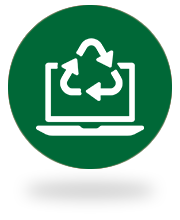SRS Group
欢迎来到 SRS Group,我们提供可循环经济综合解决方案,专注于帮助企业和组织过渡到更加可持续的、循环的生产和消费模式
我们的专家团队提供范围广泛的服务,帮助各行各业的客户实现其循环经济目标。
我们致力于为各行业提供高质量的循环经济服务
在持续推进循环经济发展的过程中,不同行业面临的需求和挑战各异,因此我们为合作伙伴量身定制解决方案。无论您是中小型企业还是大型企业,我们拥有专业团队、知识和资源来帮助您实现目标。我们注重可量化的结果,在合作的每个阶段都为您提供最优质的客户服务。
了解更多关于我们服务面向的产业
欧盟规定
欧盟 (EU) 已颁布多项法律法规以促进企业向循环经济的转型。以下是其中一些重要的法律法规:
2015年12月,欧盟提出循环经济一揽子计划,包括四项废物管理立法修正建议、一个完整的行动计划及后续行动清单,构建了欧盟发展循环经济的战略构想。
2019年12月,《欧洲绿色协议》发布。该协议以2050年实现碳中和为核心战略目标,构建经济增长与资源消耗脱钩的现代经济体系。作为支撑该新政的一个重要支柱,2020年3月11日欧盟发布了新版循环经济行动计划,核心内容是将循环经济理念贯穿产品设计、生产、消费、维修、回收处理、二次资源利用的全生命周期,加快从线性经济转型到循环经济的发展方式,减少“碳足迹”,增加可循环材料使用率,引领全球循环经济发展。
俗称碳关税,是欧盟于2023年5月10日新出台的一项法律条例。该条例旨在调节排放交易体系内,进入欧盟的产品和欧盟生产的产品之间的碳排放差距。现阶段监测的主要对象为:钢铁,水泥,铝,化肥,电力和氢。这六大行业也是全球碳排放的主要来源。
在2023年10月1日至2025年12月31日的过渡期内,欧盟进口商有义务提交以上类别进口商品的直接或间接碳排放季度报告,但无需为此缴纳费用。从2026年1月1日起,进口商需要每年申报前一年进口到欧盟产品的数量及其碳排放量,并缴纳碳关税。
其目的是从根本上防止温室气体排放从欧盟转移至其它政策相对宽松的国家。
ESG是英语Environmental(环境),Social(社会)和Governance(公司治理)的缩写,2023年7月31日,欧盟正式审批通过了首批12项《欧洲可持续报告准则》,并于2024年1月1日起生效。
从 2025 年开始, 所有大型企业和被视为公共利益实体、雇用至少 500 人、资产负债表总额超过 8500 万兹罗提或年收入超过 1.7 亿兹罗提的公司将被纳入要求撰写2024年ESG 报告的范围。
2026 年起,满足以下3 个条件中至少2 个的公司将被纳入报告范围:雇用超过 250 名员工,资产负债表总额超过 8500 万兹罗提,或年收入超过 1.7 亿兹罗提。
2027年,在受监管市场上市的中小型企业,如果满足以下3个条件中的至少2 个条件,也将被要求提交 ESG报告:雇用超过 10 人、资产负债表总额超过 150 万兹罗提、或年收入超过 300 万兹罗提。
欧盟法律法规指出了日益增加的废旧电子产品对环境造成的不良影响及其后果。该指令通过实施以下几点来帮助实现可持续生产及消费:
- 以防止产生更多的电子垃圾为首要目标
- 提高资源利用率以及资源回收再利用率
- 改善电子电器设备生命周期内各环节参与者的环境绩效
电池是重要的能源,也是可持续发展、绿色出行、清洁能源和气候中和的关键推动因素之一。该条例规定了有关电池的可持续性、性能、安全、收集、回收和二次使用的一系列办法,以及有关面向最终用户和经营者的电池信息披露细则。
条例适用对象涵盖了各类型电池,并将其归类为5大类:电动车电池,轻型交通工具电池(例如电动滑板车),工业电池,启动照明和点火用电池,以及不属于以上类型的其它便携式电池。
该法案于2024年2月18日生效,相关企业需要在以下几个方面符合规定:电池可持续性和安全性;标签信息;电池供应链尽职调查;废旧电池管理;数字电池护照;绿色公共采购等。
该草案提议将环保设计方法应用于多种产品,以消除其最有害的环境影响。并计划建立一个与新循环经济行动计划中提出的可持续性和循环目标相一致的环保设计要求框架。
这些要求包括产品耐用性、可重复使用性、可升级性、可修复性、环保材料、能源和资源效率、回收成分、再制造以及减少碳足迹。
在目前的消费模式下,当产品出现问题时,许多消费者往往不会寻求修复它们,而是过早地丢弃,即使这些产品可以被修复并使用更长时间。这直接导致了资源浪费增加,温室气体排放增加,以及为了生产新商品而对获取原材料需求增加。
为了促进可持续消费,该指令旨在增强消费者所购买的产品在保修范围内和范围外的可修复性和可再利用性。










